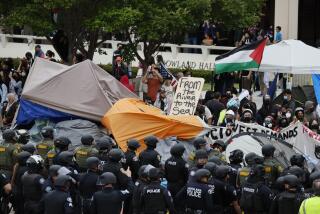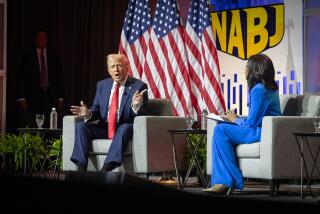Governor Deplores CSUN’s Choice of Duke for Debate
- Share via
As Gov. Pete Wilson weighed in heavily Friday against the scheduled appearance of former Ku Klux Klan leader David Duke at a college debate over affirmative action, political consultants on both sides said that if Duke was invited as a ploy to defeat Proposition 209, it will probably backfire.
Proposition 209 proponents contend that Duke was invited to speak against affirmative action at Cal State Northridge as a maneuver to associate the ballot measure--which also opposes affirmative action--with the racist Klan.
If that is the thinking of the student government that invited Duke, “I think it’s stupid,” said Democratic consultant Parke Skelton, who opposes the ballot initiative.
Bringing in Duke to represent anti-affirmative action views, Skelton said, is equivalent to claiming that the initiative’s supporters share Duke’s views about race.
“It’s basically saying that if you support this initiative, you are a Nazi,” Skelton said. “Get out your Dale Carnegie on how to win friends and influence people--I don’t think it says calling your opponents Nazis will win them over.”
Still, some opponents of the initiative say Duke’s support of 209 shows that the measure is extreme and should be rejected.
“If David Duke is comfortable with 209, it is a clarion call,” said Patricia Ewing, chairwoman of the campaign to defeat the measure. “It is a warning bell for Californians to stand up and see how divisive this measure is.”
Duke is scheduled to debate affirmative action with Los Angeles civil rights leader Joe Hicks at the university Sept. 25. Although the debate is over affirmative action in general, it has become involved in the campaign over Proposition 209, which is aimed at ending racial and gender preferences by state and local government agencies in hiring, promotion, contracts and college admissions.
In a prepared statement, Duke himself expressed support for Proposition 209 and defended the student body’s choice of him to make arguments against affirmative action. The Louisiana legislator and Republican U.S. Senate candidate called Wilson a “Johnny-come-lately” to the fight against affirmative action and took credit for starting a wave of anti-affirmative action measures.
“Everyone knows that politicians ducked the issue until they observed my success,” said Duke, whose resume identifies him as a former member of the Knights of the KKK and founder of the National Assn. for the Advancement of White People.
Several key supporters of the ballot initiative, including UC Regent Ward Connerly, the campaign chairman, have characterized the move to bring Duke to campus as a thinly veiled dirty trick.
Wilson, speaking at an impromptu news conference in Sacramento Friday, said Duke’s presence at the debate “is to be deplored.”
“There should be no misconception that David Duke represents the 209 campaign,” Wilson said. “He does not. He has nothing to do with it.”
But the students who extended the invitation to Duke have said that they were simply looking for participants in a debate on affirmative action. Duke, said student Senate President Vladimir Cerna, was the only affirmative action opponent who agreed to speak.
Associating Duke with Proposition 209 “was not the intent” of the student Senate, said Cerna.
Larry Levine, a Democratic political consultant who opposes Proposition 209, said he doesn’t think Duke’s presence will keep people from supporting the measure.
“Historically, students have always sought out the most outrageous, controversial speakers of the time for the express purpose of shaking up the system,” Levine said.
But, he said, to presume that voters will reject the initiative because Duke favors it “underestimates the intelligence of the voters.”
Allan Hoffenblum, a Republican political consultant who favors 209, said the students who invited Duke to speak are just “children being children.”
Better tactics for defeating the measure, Hoffenblum said, are already being employed by opponents, including arguments that the proposition would reduce opportunities for women.
CSUN President Blenda Wilson on Friday rebuffed suggestions by Connerly that she was partly responsible for the invitation to Duke.
“There has been no role played by me or the university administration in planning this event,” said Wilson, who earlier publicly opposed Proposition 209.
She said that unless the event created a threat to public safety--such as by provoking unruly demonstrations--she would not intervene.
“Our students have the right to invite speakers using their own funds to hear views they want to have heard,” Blenda Wilson said. “Their speakers do not have to be approved by any university official.”
Arnold Steinberg, a Republican consultant who is working for the Proposition 209 campaign as a pollster, said he regards the students’ claims that they were not trying to influence the election as disingenuous. He said that Blenda Wilson at least ought to criticize the invitation as a bad idea.
But, he believes that it will not turn voters away from the initiative.
He said that polls have shown that while the electorate is divided over affirmative action, most people are uneasy with the idea of racial and gender quotas and hiring preferences. This unease is so widespread, he said, that any implication that it betrays Klan-type beliefs will offend many voters.
Mayor Richard Riordan, who is opposed to Proposition 209, was in Israel and unavailable for comment Friday. But a senior staff member criticized the choice of Duke.
“It’s an affront to reasonable people who are able to speak against affirmative action issues,” the staff member said. “The mayor would consider this an insult to people who want to have reasonable discussions on a real policy situation.”
More to Read
Get the L.A. Times Politics newsletter
Deeply reported insights into legislation, politics and policy from Sacramento, Washington and beyond. In your inbox three times per week.
You may occasionally receive promotional content from the Los Angeles Times.









